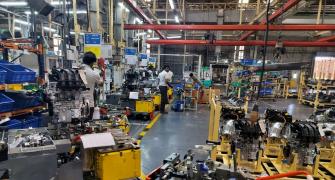 China has cast a long shadow on India’s economy. For over two decades now, India’s northern neighbour has been the world’s fastest growing economy raising global demand for everything — from industrial metals to agricultural commodities, automobiles and construction equipment.
China has cast a long shadow on India’s economy. For over two decades now, India’s northern neighbour has been the world’s fastest growing economy raising global demand for everything — from industrial metals to agricultural commodities, automobiles and construction equipment.
China’s economic growth, at constant prices, slowed down to 7.3 per cent in the September quarter, expanding at its slowest pace since the Lehman crisis of 2008. The country now risks missing its official growth target for the full year, the first time in 15 years.
The slowdown has been attributed to a slump in the property market that dragged down manufacturing output and investment. This added to concerns about flagging global growth.
According to International Monetary Fund’s World Economic Outlook, released earlier this month, China is expected to grow 7.4 per cent in the current calendar year, against 7.7 per cent in 2013. The country’s economy is likely to slow down further to 7.1 per cent in 2015 and 6.8 per cent in 2016.
“For global commodity producers that were counting on continued rapid growth in Chinese demand, this has come as a rude shock. It helps explain the sharp drop in iron ore and coal prices. It might also be responsible for some of the weakness in oil prices.
For many of the individual base metals, however, specific fundamentals are playing a more significant role than generic Chinese growth; for example, Indonesia’s ban on exports of unprocessed raw materials,” says Nic Brown, head of commodities research, Natixis, London.
These changes are expected to lead to permanently slower Chinese growth, so some commodity markets might have to adjust to a materially different trajectory of demand growth.
A decline in Chinese appetite for commodities would be felt the most by Indian metal producers like Tata Steel, JSW Steel, SAIL, Sesa Sterlite and Hindalco. Lower international prices would hurt realisations and profitability. Integrated players like Tata Steel and SAIL, which have own mines will feel the biggest impact; while those like JSW, which buy coal and iron ore from open market would be the least affected.
On the brighter side, a moderation in commodity prices would provide a relief to user industries like automobiles, auto ancillaries, capital goods, consumer durables, tyres and cement. Companies in these sectors could see an expansion in margins, as raw material costs would decline.
“Due to a slowdown in China, the demand from that country for natural rubber has fallen 30 per cent. This has led to a 15-20 per cent decline in rubber prices across the world. That is a positive for us from the margins point of view,” says Arnab Banerjee, executive director (operations), Ceat.
The worrying part for companies is the risk of a spike in low-cost imports, as Chinese manufacturers push their excess production in export markets globally, including India. Tyre and steel makers are already feeling the pressure of a dip in Chinese prices for their respective products.
“As demand slows down in their home market, Chinese tyre makers might start exporting tyres at very competitive rates to the rest of the world. The US is already planning an anti-dumping duty. A Chinese tyre can be 30 to 40 per cent cheaper; and it is good news for consumers. The commercial vehicle tyre segment will be more affected, as consumers there hardly care for brands; they look for value,” says Banerjee.
Indian steel manufacturers like JSW Steel and Tata Steel were forced to lower their prices, in line with a drop in Chinese prices. They now fear a dumping from across the border. China accounts for nearly half the world’s steel production and is facing a glut at present, as construction and investment has slowed down.
This has raised some concern about India’s growth prospects. Since the Lehman crisis, China has accounted for nearly a third of incremental growth in world economy and cushions the impact of a recession in the US and euro zone. China’s share in world gross domestic product growth is expected to fall to a fifth by 2016, according to IMF data for 178 countries.
This might have some negative impact on India’s export growth, which has been a key driver of economy and corporate earnings growth in the past three years. China’s share in India’s merchandise export basket fell to four per cent during the April-June period this year (from 4.7 per cent in the corresponding period last year and 6.7 per cent in 2008-09). This coincided with a slowdown in India’s export growth.
Imports from China, however, remained strong and accounted for 12.1 per cent of India’s total merchandise imports in the June quarter, against 1.3 per cent in the same period a year before and 10.7 per cent in 2008-09.
But economists rule out an immediate impact of China’s slowdown on India’s GDP growth. “There is no one-to-one correlation between Chinese expansion and India’s economic growth. China is still a minor export market for us when compared with the US or Europe. If growth in the US economy recovers as expected, the export upside to the US — both for merchandise and IT services — will more than make up for any slack from China,” says Devendra Pant, economist & head of public finance at India Ratings.
Others see in the Chinese slowdown a stimulus for the Indian economy, with a decline in prices of crude oil and metals. “At the macro level, inflation through imports would tend to come down; that will improve cost structures of companies and help them improve their margins — at the time when the economic conditions are looking up. This reduction in commodity prices has been quite fortuitous for India Inc. At a broader level, this can be the starting point of seriously contemplating a rate cut by the central bank,” says D R Dogra, managing director, CARE Ratings.
The impact of China’s slowdown on India Inc, it mostly appears, would depend on an interplay of lower input prices, higher competition from cheaper imports and a potentially slower global growth.










